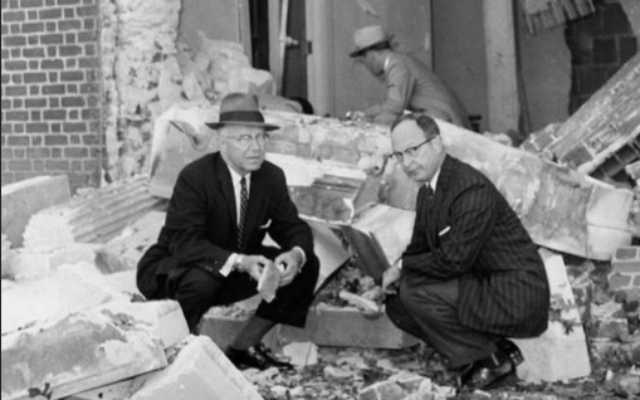The Temple Talks Racial Progress to Mark 1958 Bombing Anniversary
Panel of Black leaders and Jewish leaders explored the lessons that decades of working together have accomplished.

Sixty-five years ago, early on the morning of Oct. 12, 1958, The Temple in Midtown was bombed. The explosion destroyed an outer wall of the building, wrecked offices and mangled a staircase, but because the explosion happened so early in the day, no one was injured.
The explosion was thought to have been in response to the outspoken support by The Temple’s rabbi, Jacob Rothschild, for the civil rights of African Americans and the racial integration of the nation’s public schools.
Following the bombing, the quick show of support by Atlanta’s Mayor William Hartsfield galvanized the community to come together in support of The Temple and the city’s Jewish community and helped to cement the national reputation of Atlanta as a “city too busy to hate.”
To mark the anniversary, The Temple on Oct. 29 brought together a bi-racial panel to discuss how the relationship between African Americans and Jews has played out in the years since the bombing. It also looked at some of the tension brought on in recent weeks by the war between Israel and the Palestinians in Gaza.
The discussion in The Temple’s main sanctuary was moderated by Rabbi Lydia Medwin, who helps to lead the Rothschild Institute for Racial Justice at the synagogue.
Other panelists included Lauren Linder, who is an African American member of the congregation and the chair of the Institute, The Temple’s Senior Rabbi, Peter Berg, Sherry Frank, who led the American Jewish Committee for many years and helped found the AJC Black Jewish Coalition in 1982, and the Rev. Shawn Smith, who is the African American pastor of the New Horizons Baptist Church and a senior advisor to Atlanta Mayor Andre Dickens.

For nearly an hour and a half, the panel reminisced about their experiences of working together on social and racial issues in the past. They were also challenged by Rabbi Medwin to speak about what was important now.
Linder: We’re in a moment where there’s a lot to unpack and we don’t need to unpack it all in 10 minutes. But I’m going to try to have the courage to say, I want to understand others and to have the courage to say I want to listen. I think both are really important things and a beautiful thing. And I think it takes a lot of effort and energy, but it’s worth it.
Rabbi Berg: For me, the relationships with the Black clergy in this city, personally and professionally, have been absolutely transformative. I’ve lived in five or six different cities, and I have never experienced the kind of closeness and relationship that I have experienced here in Atlanta. And developing those relationships is the most important thing, especially when we’re dealing with difficult…conversations that need to happen.
Rev. Smith: We seem to be conditioned in a culture which has been exacerbated by social media that says if I’m going to be a part of the group, I have to agree with everything about the group or you’re expelled. But this is not human. We don’t operate our families like that. Even with those who share our DNA we don’t agree on everything. I want to find a way that we remain family. There’s ebb and flow in every relationship.
Frank: I don’t think it’s a moment to defend our history. I think it very much is a moment to pray for peace, for Israel, to pray for the innocents being caught in this horrible web of destruction on both sides, to be strong and kind and to build strength among our own Jewish community. I want us to answer our children who are asking questions, And I think a lot of us in the Jewish community need that time to deal with all the pain we have experienced.
Rabbi Berg: A rabbi from Israel who recently participated during a Friday night service in an online conversation is frequently asked by Americans how we can help. What can we do? She said, if you really want to help us in Israel, be proud to be Jewish and lead and live your most authentic Jewish life. To work in partnership with people who we can make a difference and truly lead beautiful, moral, courageous Jewish lives.
There is no word for history in Hebrew, Rabbi Medwin noted; we use, instead, the word for “memory,” because we understand that the past lives always within us to provide our inspiration for the future.
“Those are the stories that we go back to,” Rabbi Medwin said, “to mine for meaning and to dig in their wells of inspiration and hope so that we can feed and nourish ourselves today.”



comments